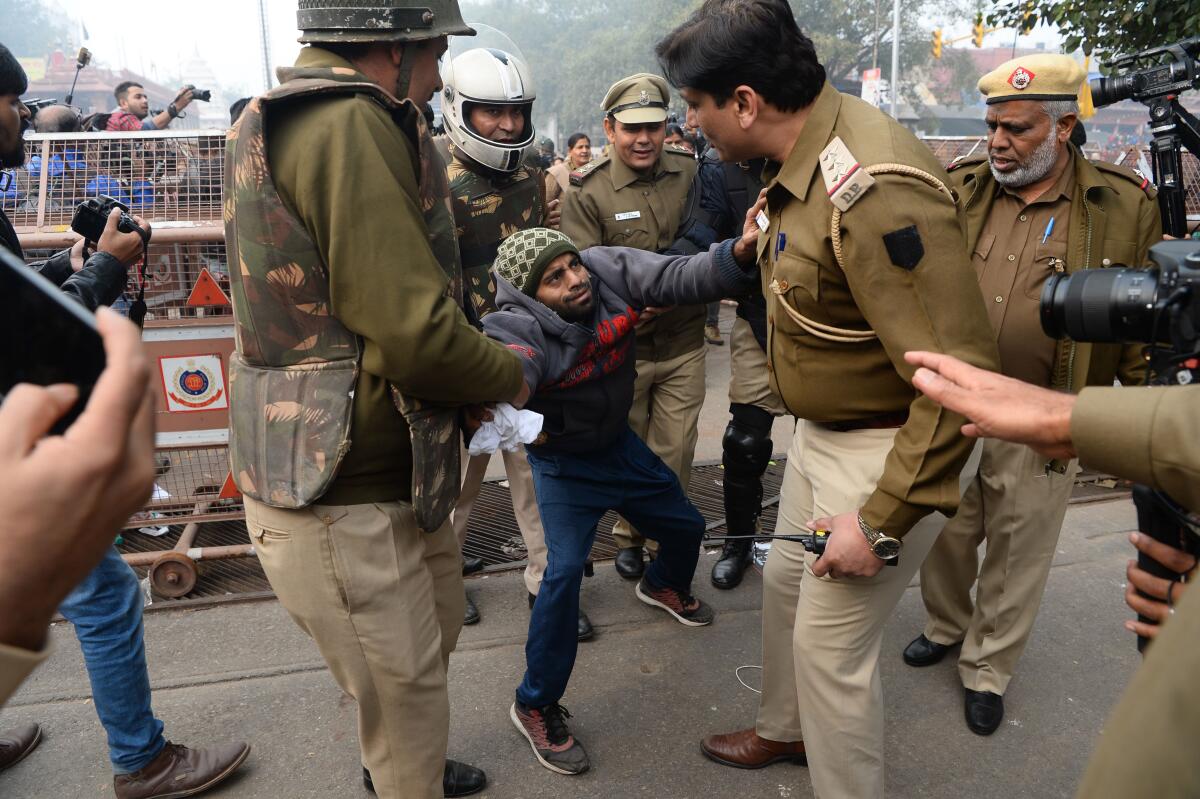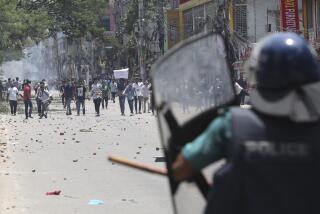1,200 detained in India amid ban on citizenship law protests

NEW DELHI — Police detained more than 1,200 protesters in some of India’s biggest cities Thursday after they defied bans on assembly that authorities imposed to stop widespread demonstrations against a new citizenship law that opponents say threatens the country’s secular democracy.
At least three people were reported killed as protests raged around the country despite the bans as opposition increased to the law, which excludes Muslims. The legislation has sparked anger at what many see as the government’s push to bring India closer to a Hindu state.
Authorities erected roadblocks and disrupted internet and phone services, including in parts of New Delhi, and tightened restrictions on protesters in the northeastern border state of Assam, where the protests began last week.
A curfew was imposed in parts of Mangalore, a city in southern Karnataka state, after police fired warning shots and used tear gas and batons to disperse a large group of protesters.
At least two people were killed during clashes with police, the Press Trust of India news agency said late Thursday. Details were not immediately available because top police officers could not be reached by phone.
Protesters also clashed with police in parts of Lucknow, the state capital of northern Uttar Pradesh state, where police said one person died from a gunshot fired by someone among the protesters. The protesters torched a bus, hurled rocks at police and damaged some police posts and vehicles, Police Officer Vikas Dubey said.
The new citizenship law applies to Hindus, Christians and other religious minorities who are in India illegally but can demonstrate religious persecution in Muslim-majority Bangladesh, Pakistan and Afghanistan. It does not apply to Muslims.
Critics say it’s the latest effort by Prime Minister Narendra Modi’s Hindu nationalist-led government to marginalize India’s 200 million Muslims, and a violation of the country’s secular constitution.
Modi has defended it as a humanitarian gesture.
Rather than contain uprisings, the protest bans appear to be helping them spread — from Assam and a handful of university campuses and Muslim enclaves in the capital — to campuses and cities from coast to coast.
“I think what is wonderful is that young people all in their 20s have so vividly understood the game plan, which is to divide people,” said Zoya Hasan, a political scientist in New Delhi. “What people are saying is that you are going to divide, we are going to multiply.”
The protests come amid an ongoing crackdown in Muslim-majority Kashmir, the Himalayan region stripped of its semiautonomous status and demoted from a state to a federal territory last summer. They also follow a contentious process in Assam meant to weed out foreigners in the country illegally. Nearly 2 million people were excluded from an official list of citizens, about half Hindu and half Muslim, and have been asked to prove their citizenship or else be considered foreign.
India is also building a detention center for some of the tens of thousands of people the courts are expected to ultimately determine have entered illegally. Modi’s interior minister, Amit Shah, has pledged to roll out the process nationwide.
Critics say the process is a thinly veiled plot to deport millions of Muslims.
The Modi government, which won a landslide reelection in May, had been able to push through those parts of its agenda without much opposition. That changed with the citizenship law.
“This may be a crack in the edifice” of the Modi government, said Nilanjan Mukhopadhyay, a political analyst and Modi biographer.
Some of the country’s unwieldy and divided opposition parties have found common ground in condemning what they say has been a heavy-handed official response to the protests.
It’s a good rallying point for the opposition because it is “a battle for liberal and democratic values,” said Asaduddin Owaisi, a lawmaker and president of the All India Majlis-e-Ittehadul Muslimeen party.
More to Read
Sign up for Essential California
The most important California stories and recommendations in your inbox every morning.
You may occasionally receive promotional content from the Los Angeles Times.










